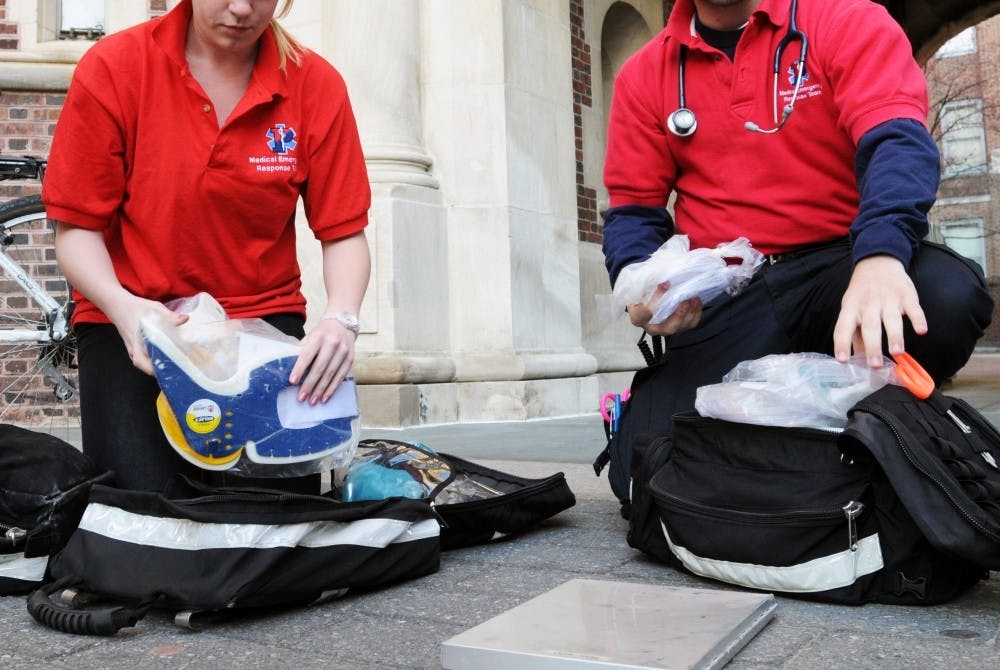When you’re about to leave a party, Alex Zhou’s (C’20) night is just beginning. As part of the youngest group of MERT members, Alex has already gotten the chance to flex his EMT muscles. And while he can’t go into details about the cases he’s worked on, his job’s a lot harder than just peeling drunk people off the sidewalk.
“It’s so worth it,” Alex said with a smile when asked about spending every Saturday morning last semester in MERT training. He walks in looking more awake than a typical student would at 11 a.m. on a Saturday. It’s easy to see him as an EMT—friendly, put together, and genuinely happy to talk about making an impact on campus. You’d never guess that he’s only 18.
When students think of MERT, they think of students in red jackets walking into parties with the authority that only comes with knowledge and skill. It’s almost intimidating. But when asked about charging in to save the day, Alex acknowledges that he’s the one who’s intimidated. “Since I’m really new to this I don’t really feel like an EMT, to be honest,” he says. “But at the time, you just sorta have to set that aside and just do what needs to be done.” Alice Zhou (C’20) feels the same way: “I always worry about responding to calls that are not students, that they’ll see students showing up, and they’ll be like, ‘you guys don’t know what you’re doing.’”
The training isn’t a walk in the park either. For freshmen who want to join MERT, they first have to interview to see if they can even take the training. Those who pass go through an EMT training that takes place every Saturday from 8 a.m. (to reiterate, that’s Saturday at 8 a.m.) to around 5 p.m., before taking two final exams at the end of the course to become a certified EMT. The National Psychomotor Exam occurs first. Students taking the exam go through different stations, and each station is supposed to test their ability to use certain equipment or react to certain scenarios. For example, a possible scenario could be an unconscious person whose heart rate is low. The students who pass the first test go on to take the National Cognitive Test, which is around 100 multiple choice questions.
But before all these exams, students have to go through training. “Before every Saturday we would have to do readings. So we’d have like four chapters of reading to do. You were supposed to space it out over the week, but no one did that so everyone just crammed Friday. So literally all of our Fridays were taken up by reading.” said Alice. It’s clear that training is time consuming; Alex jokes that “it sort of ruined [his] second semester freshman year.” And when asked about what each Saturday training actually involves? “Every week we had a test on the reading. And then for the class, what we do is I guess we sort of review the material that we read, and then we’d also do physical training related to what we read. So if we read about allergies, we learned how to use the EpiPen.” said Alice.
But ensuring others’ welfare and getting hands–on experience with patients makes it all worth it. According to Alice, “there was no point during [the process] when [she] was like, "oh, I wish I hadn’t done this.” She added, “Being an EMT is the closest we’re gonna get during undergraduate years to clinical experience. And it’s the closest we’re gonna get to interacting with patients and actually doing stuff that’s medical related,” she says. And it makes sense. Most people in MERT are interested in the medical field, but they don’t feel as though they’re getting the medical experience from their biology and chemistry classes as undergraduates. MERT allows them to get that hands–on experience that they’ve been craving.
The new members of MERT have a lot to look forward to in the next few years. They’ll be saving lives, working with human patients, and learning more about the medical field than they would in any classroom. They may not feel like official EMTs now, but you should be more thankful for their existence every time you go out. Even if they’re still in their teens.

